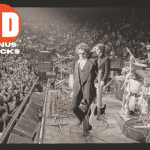Post-9/11’s “Great Quiet” and Steve Earle’s “John Walker’s Blues”
The venerable online music magazine Perfect Sound Forever ran an amazing piece this month called “Steve Earle: Sympathy For An American Terrorist,” which is an excerpt from Dorian Lynskey’s recent book “33 Revolutions Per Minute – A History of Protest Songs,” which has immediately risen to the top of my “have to read this RIGHT NOW” list. The excerpt profiles that dark period after the September 11th attacks which REM had referred to as “the Great Quiet,” when Clear Channel was creating lists of “lyrically questionable songs,” and the idea of being an American and writing any kind of controversial or “protesting” song seemed positively unpatriotic.
I remember that time clearly. I was a sophomore at Indiana University, having just transferred there from a small private Christian college a few weeks prior. I remember walking to class on September 11, 2001 and being as stunned as everyone, when no one knew what had happened and why.
But I also remember the smothering feeling which came afterwards, when everything you said had to be parsed against the idea of seeming like you weren’t supporting America in trying times. I bought a copy of Bleed American by Jimmy Eat World on September 12th while trying to get my mind onto other things. Weeks later the only copies you could find were the reissues, which were simply titled Jimmy Eat World, because the band feared the title might be misinterpreted as “Bleed, American.”

I, meanwhile, admired Earle for daring to write a song about a boy who essentially converted to Islam because of what he’d heard from hip hop on MTV. Misguided as he may have been, he believed he was on the right path and he fought for what he believed. And like Earle says, it really could have been anyone. The national outrage, in retrospect, does seem like it was aimed at keeping anyone else from falling out of line. “Don’t say anything controversial! They’ll accuse you of aiding the terrorists!”
I’m reminded of an article James McMurtry wrote for Billboard in 2006, called “Musicians: Keep The Politics In Your Songs.” In that article, McMurtry spoke of an urgent need for artists to stand behind what they believe. He wrote of Steve Earle’s “Billy Austin,” which the Lynskey excerpt deems the lyrical precursor to “John Walker’s Blues,” and how Earle proved to McMurtry that you could write a good, politically motivated song (in this case from the perspective of a death-row inmate who admits he committed a crime.) He took it further, after the Dixie Chicks were told to “shut up and sing,” arguing that – as Kris Kristofferson responded to that “shut up and sing” comment – maybe it’s time for music fans to “shut up and listen.”
“Most of us so-called artists are so afraid to use our voices, afraid to take a stand for fear of committing career suicide,” McMurtry wrote. “We have to get over that fear, because in succumbing to it, we become invisible … it is not our job to be loved. It is our job to be remembered.”
Reading the Lynskey excerpt reminded me of a time in my musical exploration where I truly took that adage to heart. It’s not our job to be loved, it’s our job to be remembered. Since then I’ve appreciated artists who speak their mind regardless of the potential cost to their fan-bases. I respect musicians who are willing to say something because it needs to be said, not because it’s going to be a popular, money-making proposition.
I am nervous as we near the tenth anniversary of the September 11th attacks. Though it’s a different climate now, where the wars in Afghanistan and Iraq have been dragging on for far too long and the American people are tiring of constant bloodshed and endless turmoil, it’s easy to fall back on the memories and take the wrong lessons from them. I’d like to remember that, in a time when people were told it was unpatriotic to have opinions which differed from the status quo, there were people like Steve Earle and James McMurtry who were willing to pick up the slack for all of us.
Steve Earle’s “John Walker’s Blues” is a modern folk touchstone, and Lynskey’s excerpt is necessary reading if we’re not going to forget what it meant that Earle was willing to put his career on the line to simply say that even John Walker Lindh, the so-called “American Taliban,” was worthy of a first-person narrative that treated the reasons he’d travelled down that road with thoughtful consideration:
I’m just an American boy raised on MTV
And I’ve seen all those kids in the soda-pop ads
But none of them looked like me
So I started lookin’ around for a light out of the dim
And the first thing I heard that made sense was the word
Of Mohammed, peace be upon him …




